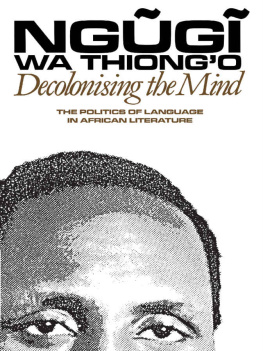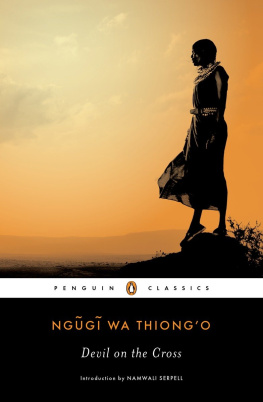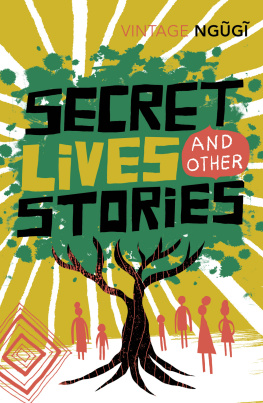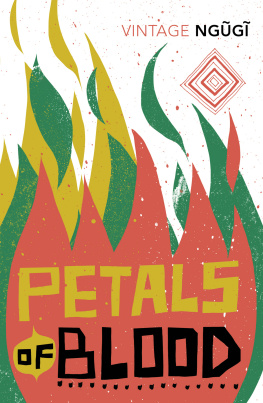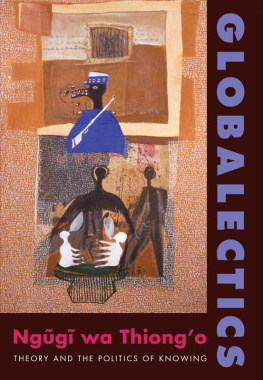Ngugi Wa Thiongo - Wrestling with the Devil
Here you can read online Ngugi Wa Thiongo - Wrestling with the Devil full text of the book (entire story) in english for free. Download pdf and epub, get meaning, cover and reviews about this ebook. year: 2018, publisher: The New Press, genre: Religion. Description of the work, (preface) as well as reviews are available. Best literature library LitArk.com created for fans of good reading and offers a wide selection of genres:
Romance novel
Science fiction
Adventure
Detective
Science
History
Home and family
Prose
Art
Politics
Computer
Non-fiction
Religion
Business
Children
Humor
Choose a favorite category and find really read worthwhile books. Enjoy immersion in the world of imagination, feel the emotions of the characters or learn something new for yourself, make an fascinating discovery.

- Book:Wrestling with the Devil
- Author:
- Publisher:The New Press
- Genre:
- Year:2018
- Rating:5 / 5
- Favourites:Add to favourites
- Your mark:
- 100
- 1
- 2
- 3
- 4
- 5
Wrestling with the Devil: summary, description and annotation
We offer to read an annotation, description, summary or preface (depends on what the author of the book "Wrestling with the Devil" wrote himself). If you haven't found the necessary information about the book — write in the comments, we will try to find it.
Wrestling with the Devil — read online for free the complete book (whole text) full work
Below is the text of the book, divided by pages. System saving the place of the last page read, allows you to conveniently read the book "Wrestling with the Devil" online for free, without having to search again every time where you left off. Put a bookmark, and you can go to the page where you finished reading at any time.
Font size:
Interval:
Bookmark:
Table of Contents
Also by Ngg wa Thiongo
Novels (English)
The River Between
Weep Not, Child
A Grain of Wheat
Petals of Blood
Devil on the Cross
Matigari
Wizard of the Crow
Short Stories (English)
Secret Lives
Novels (Gky)
Caitani Mtharabain
Matigari ma Njirngi
Mrogi wa Kagogo
Plays (English)
The Black Hermit
This Time Tomorrow
The Trial of Dedan Kmathi (with Micere Mugo)
I Will Marry When I Want (with Ngg wa Mri)
Plays (Gky)
Ngaahika Ndeenda (with Ngg wa Mri)
Mait Njugra
Essays (English)
Homecoming
Moving the Center
Penpoints, Gunpoints, and Dreams
Decolonizing the Mind
Something Torn and New (also issued under the title Re-Membering Africa)
Globalectics: Theory and Politics of Knowing
In the Name of the Mother
Secure the Base: Making Africa Visible in the Globe
Memoirs (English)
Dreams in a Time of War
In the House of the Interpreter
Birth of a Dream Weaver
Childrens Books (English)
Njamba Nene and the Flying Bus
Njamba Nenes Pistol
Childrens Books (Gky)
Njamba Nene na Mbathi Mathagu
Bathitora ya Njamba Nene
Rwmbo rwa Njk
Allegory (Gky)
Nyoni Nyonia Nyone
About the Author
One of the leading African writers and scholars at work today, Ngg wa Thiongo was born in Limuru, Kenya, in 1938. He is the author of Wizard of the Crow; A Grain of Wheat; Weep Not, Child; Petals of Blood; and Birth of a Dream Weaver (The New Press). He is currently Distinguished Professor of English and Comparative Literature at the University of California, Irvine.
Publishing in the Public Interest
Thank you for reading this book published by The New Press. The New Press is a nonprofit, public interest publisher. New Press books and authors play a crucial role in sparking conversations about the key political and social issues of our day.
We hope you enjoyed this book and that you will stay in touch with The New Press. Here are a few ways to stay up to date with our books, events, and the issues we cover:
Sign up at www.thenewpress.com/subscribe to receive updates on New Press authors and issues and to be notified about local events
Like us on Facebook: www.facebook.com/new pressbooks
Follow us on Twitter: www.twitter.com/thenewpress
Please consider buying New Press books for yourself; for friends and family; and to donate to schools, libraries, community centers, prison libraries, and other organizations involved with the issues our authors write about.
The New Press is a 501(c)(3) nonprofit organization. You can also support our work with a tax-deductible gift by visiting www.thenewpress.com/donate.
It is past midnight, December 12, 1978. Unable to face the prickly bristles of three see-through blankets on a mattress whose sisal stuffing has folded into numerous lumps hard as stones, I am at the desk, under the full electric glare of a hundred-watt naked bulb, scribbling words on toilet paper. I can hear the bootsteps of the night guard, going up and down the passageway between the two rows of cells, which face each other.
Mine is cell 16 in a prison block enclosing eighteen other political prisoners. Here I have no name. I am just a number in a file: K6,77. A tiny iron frame against one wall serves as a bed. A tiny board against another wall serves as a desk. These fill up the minute cell.
One end of the passageway is a cul-de-sac of two latrines, a washroom with only one sink and a shower room for four. These are all open: no doors. At the other end, next to my cell, the passageway opens into a tiny exercise yard whose major features are one aluminum rubbish bin and a decrepit tenniquoit-cum-volleyball net hanging from two iron poles. There is a door of iron bars at this openingbetween the exercise yard and the block of cellsand it is always shut and locked at night. The block of cells and the yard are enclosed by four double stone walls so high that they completely cut off the skyline of trees and buildings, which might otherwise give us a glimpse of the world of active life.
This is Kamt Maximum Security Prison, one of the largest in Africa. It is situated near three townsRir, Kambu, and Nairobiand literally next door to Kenyatta University College, but we could as easily be on Mars. We are completely quarantined from everything and everybody, including convicted prisoners in all the other blocks, except for a highly drilled select squad of prison guards and their commanding officers.
Maximum security: the idea used to fill me with terror whenever I met it in fiction, Dickens mostly, and I have always associated it with England and Englishmen; it conjured up images of hordes of dangerous killers la Magwitch of Great Expectations, always ready to escape through thick forests and marshes, to unleash yet more havoc and terror on an otherwise stable, peaceful, and God-fearing community of property owners that sees itself as the whole society. It also conjures images of Robben Island political prisoners, Mandela among them, breaking rocks for no purpose other than breaking them. A year as an inmate in Kamt has taught me what should have been obvious: that the prison system is a repressive weapon in the hands of a ruling minority to ensure maximum security for its class dictatorship over the rest of the population, and it is not a monopoly exclusive to England and South Africa.
The menacing bootsteps come nearer. I know that the prowling guard cannot enter my cellit is always double-locked and the keys, in turn, locked inside a box, which promptly at five oclock is taken away by the corporal on duty to a safe somewhere outside the double wallsbut of course he can look into the cell through a small iron-barred rectangular window in the upper half of the door. The barred window is built so as to contain only the face.
The bootsteps stop. I dont have to look to the door to know that the guard is watching me. I can feel it in my bones. It is an instinct that one develops in prison, the cunning instinct of the hunted. I take my time, and eventually turn my eyes to the door. The face of the guard fills the whole window: I know nothing so menacingly sinister in its silent stillness as that trunkless face glaring at one through the iron bars of a prison cell.
Professor,... why are you not in bed? the voice redeems the face. What are you doing?
Relief! I fall back on the current witticism in the detention block.
I am writing to Jomo Kenyatta in his capacity as an expolitical prisoner.
His case was different, the guard argues.
How?
His was a colonial affair.
And this, a neocolonial affair? Whats the difference?
A colonial affair... now we are independentthats the difference, he says.
A colonial affair in an independent country, eh? The British jailed an innocent Kenyatta. Thus Kenyatta learned to jail innocent Kenyans. Is that the difference?
He laughs. Then he repeats it.
The British jailed Kenyatta. Kenyatta jails Kenyans. He laughs again, adding, Take it any way you like,... but write a good petition... you might get a hearing this time.... Your star shines bright in the sky... expolitical prisoner. He chuckles to himself. Does ex- mean the same thing as latehayati?
What do you mean?
Can I say the late political prisoner instead of the expolitical prisoner?
Next pageFont size:
Interval:
Bookmark:
Similar books «Wrestling with the Devil»
Look at similar books to Wrestling with the Devil. We have selected literature similar in name and meaning in the hope of providing readers with more options to find new, interesting, not yet read works.
Discussion, reviews of the book Wrestling with the Devil and just readers' own opinions. Leave your comments, write what you think about the work, its meaning or the main characters. Specify what exactly you liked and what you didn't like, and why you think so.

